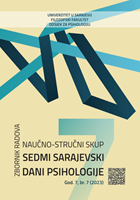Povezanost između slobodne volje i predrasuda: medijacijska uloga bespredrasudne motivacije
The relationship between free will and prejudices: the mediating role of motivation to respond without prejudice
Author(s): Neira Jažić, Nina HadžiahmetovićSubject(s): Theory of Communication, Individual Psychology, Social psychology and group interaction, Behaviorism, Methodology and research technology, Social Theory
Published by: Filozofski fakultet Univerziteta u Sarajevu
Keywords: prejudices; motivation to respond without prejudice; free will; self-regulation; mediation;
Summary/Abstract: In previous studies the belief in free will has been negatively correlated with outgroup prejudice. Also, as a form of behavioral self-control, the motivation to respond without prejudice, which can be external (avoiding public scrutiny) and internal (self-regulatory maintenance), has also been correlated with less prejudice expression. Based on previous research, free will positively correlated with behavioral self-regulation, and in turn self-regulatory processes negatively correlated with prejudice expression. Thus, the aim of this study was to investigate whether the relation between free will and prejudices may be explained by the motivation to respond without prejudice. Free will was expected to negatively correlate with prejudice through increased internal and decreased external motivation. The sample comprised 136 students. The Free Will and Determinism Scale, Internal Motivation to Respond without Prejudice Scale, External Motivation to Respond without Prejudice Scale, and Social Distance towards Roma Scale were administered having acceptable Cronbach’s alpha reliability range .57 - .86. Testing the mediation model requirements indicated that free will (IV) positively correlated with internal motivation (MV) a=.29, CI[-.0044,.5751], p= .054, and negatively correlated with social distance (DV) c=-.45, CI[-.7291,-.1790], and internal motivation also negatively correlated with social distance b=-.48, CI[-.6710,-.2980]. As external motivation was not preliminarily correlated either with free will, or social distance, it was excluded from further analysis. The results revealed a marginally significant mediational effect of internal motivation ab=-.13, CI[-.3407, .0095], which reduced, but not eliminated a direct effect between free will and social distance that still remained significant, indicating a partial mediation. In line with expecations, the findings confirmed the association of free will and prejudices, indicating that this relation might presumably be explained through self-regulatory processes (i.e., internal motivation to respond without prejudice). To further test this model, the obtained results should be replicated on a larger sample directly inducing free will.
Journal: SARAJEVSKI DANI PSIHOLOGIJE: ZBORNIK RADOVA
- Issue Year: 7/2023
- Issue No: 7
- Page Range: 33-64
- Page Count: 32
- Language: Bosnian

